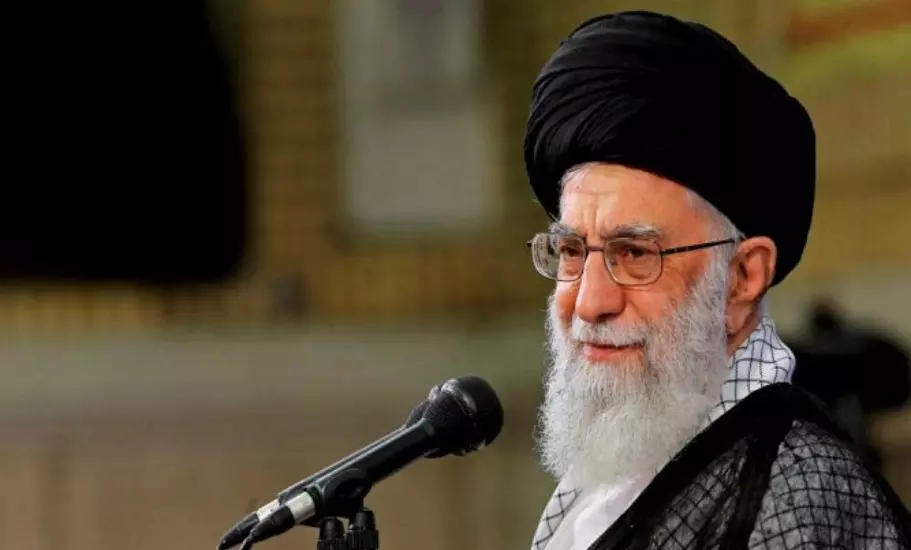
- Home
- India
- World
- Premium
- THE FEDERAL SPECIAL
- Analysis
- States
- Perspective
- Videos
- Sports
- Education
- Entertainment
- Elections
- Features
- Health
- Business
- Series
- In memoriam: Sheikh Mujibur Rahman
- Bishnoi's Men
- NEET TANGLE
- Economy Series
- Earth Day
- Kashmir’s Frozen Turbulence
- India@75
- The legend of Ramjanmabhoomi
- Liberalisation@30
- How to tame a dragon
- Celebrating biodiversity
- Farm Matters
- 50 days of solitude
- Bringing Migrants Home
- Budget 2020
- Jharkhand Votes
- The Federal Investigates
- The Federal Impact
- Vanishing Sand
- Gandhi @ 150
- Andhra Today
- Field report
- Operation Gulmarg
- Pandemic @1 Mn in India
- The Federal Year-End
- The Zero Year
- Science
- Brand studio
- Newsletter
- Elections 2024
- Events
- Home
- IndiaIndia
- World
- Analysis
- StatesStates
- PerspectivePerspective
- VideosVideos
- Sports
- Education
- Entertainment
- ElectionsElections
- Features
- Health
- BusinessBusiness
- Premium
- Loading...
Premium - Events

Iran knows that the US has not been able to take any action against North Korea because it has nuclear weapons, and the temptation to follow the same route will be very strong
The ceasefire between Israel and Iran is holding. US President Donald Trump has claimed credit for bringing it about. He also came down heavily on Israel for bombing Iran after he had announced the ceasefire. He was also critical of Iran for firing missiles at Israel after its strikes during this post-ceasefire period.
The onus for initiating the fighting lay with Israel. It began the hostilities by bombing Iranian nuclear facilities on June 13. Israeli Prime Minister Benjamin Netanyahu claimed that his country’s aerial operation would continue till his armed forces had eliminated the nuclear threat from Iran. In addition to aerial strikes, Israel also carried out assassinations of Iranian military leaders and nuclear scientists through clandestine operations undertaken by its intelligence agency inside Iran.
Iran responded by striking Israel with missiles. Israel had felt secure that it had an Iron Dome, which could protect it against Iranian missile attacks. However, Iran was able to breach Israel’s anti-missile dome when some of its missiles succeeded in penetrating it, damaging the country’s infrastructure.
Strong US-Israel bonding
From the beginning of the conflict, US sympathies lay with Israel. This is because of the strong bonds of interest between the two countries.
The leading interest that binds the two countries is to prevent Iran from making a nuclear weapon. It is this factor that led Trump to order the bombing of Iranian nuclear facilities at Fordow, Natanz, and Isfahan on June 22. It was clear that, by itself, Israel could not effectively damage the Fordow nuclear enrichment facility, which is buried deep underground within a mountain. The US B-2 bombers carried the deadliest non-nuclear bombs, which can penetrate underground structures, and unleashed them on Fordow.
Also Read: Iran delivered a heavy slap on US' face, says Khamenei
There was great uncertainty in the immediate aftermath of the US attack about Iran’s response. It was also felt that, in keeping with past experience, the people in Islamic countries would demonstrate against the US strikes. Many analysts believed that Iran may seek to bomb US bases in the Gulf area and also close the Strait of Hormuz which is vital for international shipping, especially relating to energy supplies from the Gulf states to the rest of the world, including India. All this adversely impacted the world’s share markets and also led to a rise in oil prices. Meanwhile, Trump warned Iran not to retaliate against US interests, for that, he said, would lead to more severe US aerial strikes.
Wheels of diplomacy
While these public comments were being made by the US and other countries, the wheels of diplomacy were also moving along between the US and Iran and also Qatar which hosts the biggest US base in the Gulf region. It may come as a surprise to some people, but this is how the world works. In the midst of an armed conflict, diplomacy is not abandoned. And, conversely, when attempts are being made to find diplomatic solutions to problems, violent action is resorted to.
Also Read: Talking Sense With Srini | Iran-Israel truce: ‘War paused, but region is far from peace’
It is only when there is full and all-out war between countries, such as what was witnessed during the First and Second World Wars, that the countries concerned close diplomatic channels. In some cases of wars between countries, the major powers intervene to bring about an end to hostilities. In such situations, the ultimate decisions are naturally taken by the countries at war. Most sensitive diplomatic activity takes place quietly, but then there are leaders like Trump who want to proclaim their importance to the world by claiming credit for mediating a ceasefire, even if it did not happen in some cases.
Face-saving strike by Iran
In this instance, clearly the US realised that as a proud country, Iran’s ego demanded that it take some action against US interests. Hence, with the likely intervention of Qatar, the US and Iran worked out an arrangement that Iran would fire missiles against the US’s Al-Udeid air base in Qatar. It would keep Qatar informed of the time of the attack so that it could pass on the information to the US. That would enable it to take preventive action. This is what happened on June 23.
Also Read: Markets rally in early trade amid optimism over Iran-Israel ceasefire
The US was able to neutralise all the incoming Iranian missiles. On its part, Qatar formally protested to Iran against the violation of its sovereignty, but this was only routine. And finally, in the early hours of June 24 (US time), Trump announced a ceasefire between Israel and Iran. The Iranians had always stated that they would stop firing missiles if Israel stopped its aerial action against their country.
Focus on two issues
The many questions that have arisen through and after this war will be studied by analysts for a long time. Some of these relate to why some expected reactions did not take place, but the greater analysis and projections will be about two issues. These relate to the future of Iran’s ambition to build a nuclear weapon, even though it has always denied that it has any such intention. The second is what is referred to as the possibility of regime change in Iran. This matter has been discussed off and on in Western countries, especially for the past 25 years.
It is a fact that no country in the world really wants Iran to make a nuclear weapon. After this war, it would be logical to expect that Israel would now do its utmost to prevent Iran from making one. The capability of some Iranian ballistic missiles to get through Israel’s anti-missile defences - the so-called Iron Dome - has shown that if Iran possesses a nuclear weapon, it will change the security dynamics of West Asia forever. It will embolden Iran to build bigger proxies such as Hamas and Hezbollah, and certainly, Israel will not be able to bomb the people of Gaza as it has done. This is despite Israel possessing nuclear weapons.
Also Read: Trump grapples for upper hand in debate over damage caused by US strikes on Iran
It is not certain, as yet, the extent of damage that has been caused to Iranian nuclear facilities. While Trump claims that they have been obliterated, there have been leaked reports in the US media that the country’s Defence Department’s intelligence’s initial assessment is that the Iranian nuclear programme has been pushed back only by some months. If this is the case, then the Iranians are unlikely to agree to give up their right to enrich uranium altogether. There is also the issue of enriched uranium stockpiles. No one is certain how much there is, though it is believed that it can be enriched to bomb-grade fairly quickly.
Temptation to imitate North Korea
Trump wants a deal, and so does Iran. After this war and the US bombing, Iran may engage the US in talks, but it would be logical to assume that it would do its utmost to develop a weapon. It knows that the US has not been able to take any action against North Korea because it has nuclear weapons and delivery systems. Therefore, Iran’s temptation to follow the North Korean route will be very strong.
Also Read: Iran says nuclear facilities badly damaged by US airstrikes
The next few years will therefore be one of increased international scrutiny of Iranian actions on the nuclear front and US and Israeli countermeasures. This will be accompanied by talks. However, even if talks succeed, they will not ensure that Iran will not make nuclear weapons.
Khamenei's exit may not mean system change
The term regime change is used loosely. Does it mean a change in the present Iranian system of governance in which supreme power is held by a religious leader who is chosen by a small group of religious leaders? Thus, Iran has an elected president and Parliament, but only those whose names have been approved by the religious leaders are allowed to contest in elections. This system is called the Vilayat-e-Faqih and was established by Ayatollah Khomeini after the Shah of Iran’s fall in January 1979.
The system does not permit freedoms and is particularly harsh towards women. There have been demonstrations against it, but it is well defended by the Revolutionary Guards, who have never hesitated to use force against the people to defend it. There is no political force or party that is currently present to effectively challenge this system.
Also Read: It is too early to determine damage to Iran's nuclear facilities, says IDF
The current Iranian Supreme Leader is Ayatollah Khamenei. He is 86 years old, and he will inevitably go in a few years. His successor will be chosen smoothly. That will mean a regime change, for the successor will have his views and supporters, but that will not mean a system change. That is unlikely in the foreseeable future.
(The Federal seeks to present views and opinions from all sides of the spectrum. The information, ideas or opinions in the articles are of the author and do not necessarily reflect the views of The Federal)


